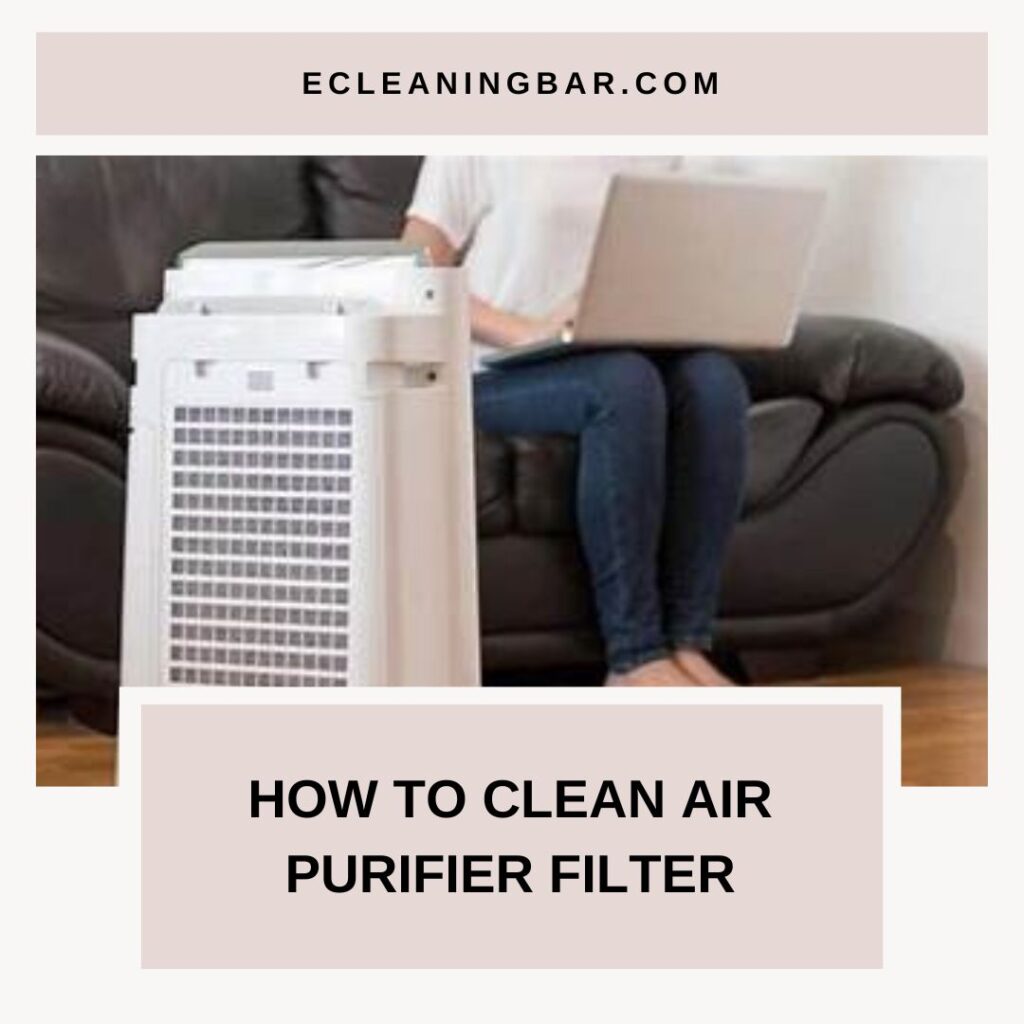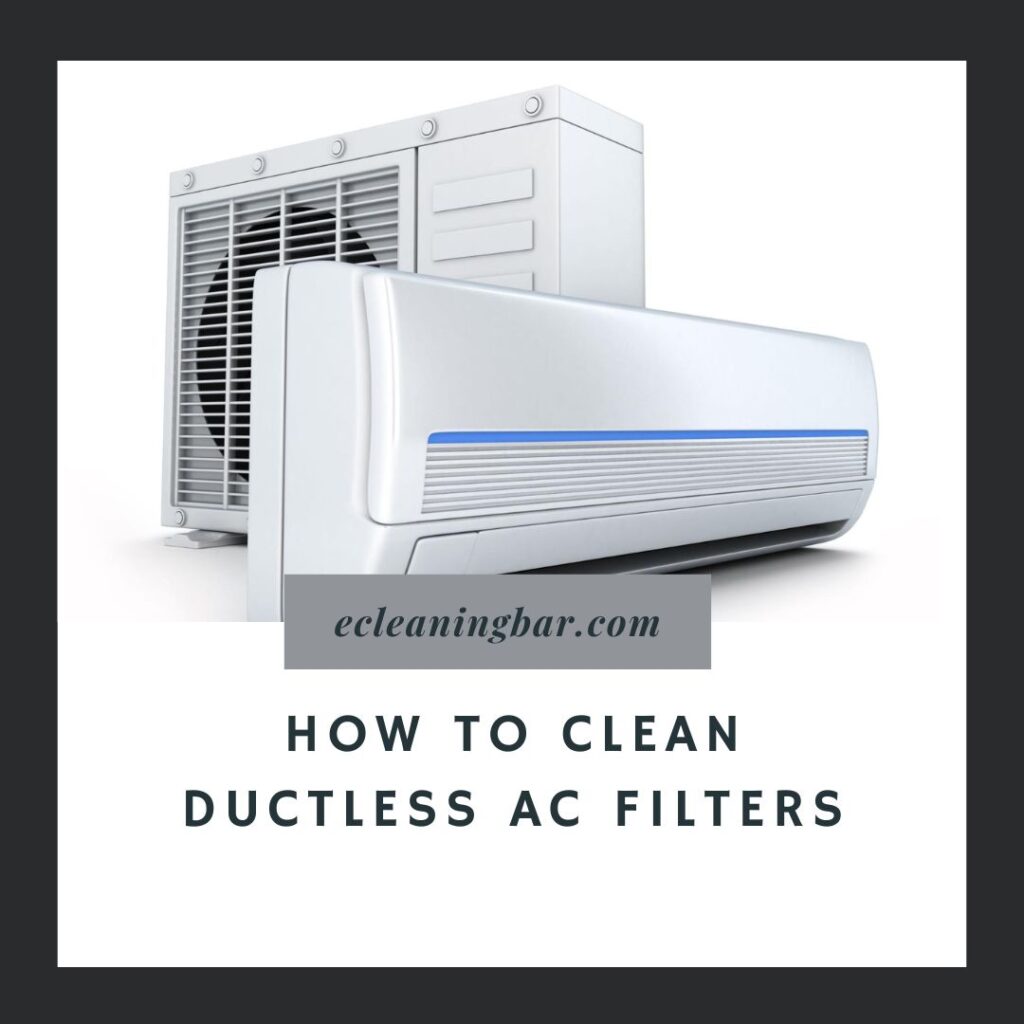The best car soap and water solution to use is to clean the exhaust pipe. When cleaning exhaust pipes, it’s also critical to use a degreaser. Even though the majority of the oil in the exhaust burns off on its own, it can remain there for a while. The lack of heat necessary to burn off oil primarily affects areas like the back of the exhaust.
When a PCV valve becomes clogged or the turbocharger malfunctions, oil may leak out of the exhaust. In addition, it could be the result of damaged pistons, blown head gaskets, defective valve seals, cracked blocks or heads, or broken piston rings. A few of these issues may be dangerous.
Five Easy Steps To Remove Oil From Your Exhaust Pipe:
It is possible that your exhaust pipe is greasy and unclean if you haven’t cleaned it in a while or if your automobile has just experienced an oil leak. The five simple techniques listed below can help you clean your exhaust pipe and get rid of oil:
Obtain The Appropriate Gear:
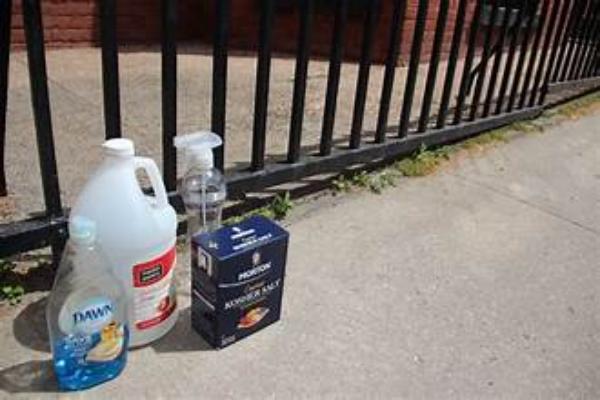
A piece of cloth, gloves to shield your hands from the oil and grime, a metal brush, a bucket filled with a solution of soap and water, degreaser, and metal polish are needed for this task.
Use Soap And Water To CleanThe Exhaust:
Utilize the soap and water mixture to remove oil residue from the exhaust system. Once the exterior of the exhaust has been cleaned, you may use any old piece of fabric to clean the interior with a metal brush. Pull away as much as you can to get rid of all the grimy layers. To expedite this procedure a bit, you can also use soap directly.
Clean The Exhaust:
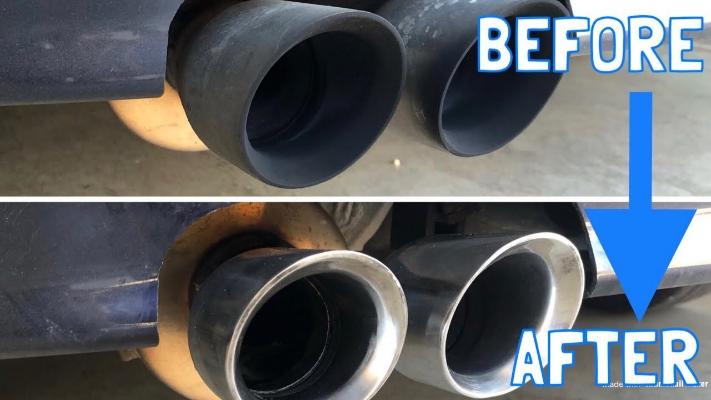
You will need to use a degreaser to remove the oil from the exhaust when you have finished cleaning the dirt off of it. Allow the degreaser to work for a few minutes after removing the exhaust.
Use A Degreaser Rag:
Using a metal brush to remove the degreaser is the next step. Make sure to rub it off as gently as possible, covering the entire exhaust. You can reapply the degreasing and repeat these steps if there is still oil present.
Shine The Exhaust:
Applying polish to the exhaust’s exterior and interior is the final stage. After a few minutes, rub the exhaust with a microfiber cloth after the polish has dried.
How Can My Exhaust System Be Cleaned?
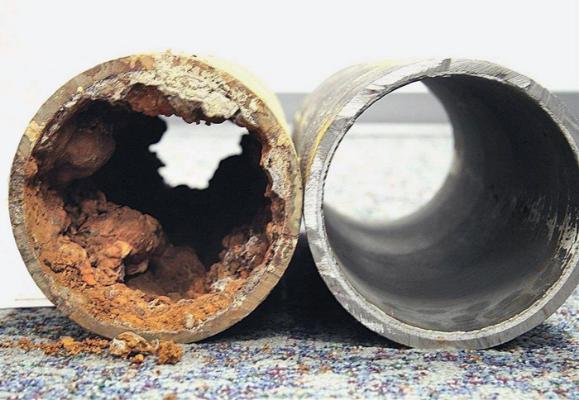
You can use an exhaust system cleaner that is sold in stores to clean your exhaust system. These fuel-mixing exhaust system cleaners burn while your fuel is being burned, cleaning your exhaust system and catalytic converter in the process.
Will Exhaust Oil Burn Off On Its Own?
Exhaust oil does eventually burn off on its own, but sometimes it takes a long time. The oil and moisture mixture remain together for a lot longer than you might think since the oil is combined with the moisture exhaled from the exhaust.
However, because of the warmth of the exhaust pipe, the oil usually burns off more quickly.
The temperature of the exhaust pipe may rise to 600–700 degrees Fahrenheit, which is more than sufficient to burn the oil in the exhaust. If the cause of the oil leak is not fixed, it will take a little longer for it to burn off continuously.
How Would Oil Get Into The Exhaust?
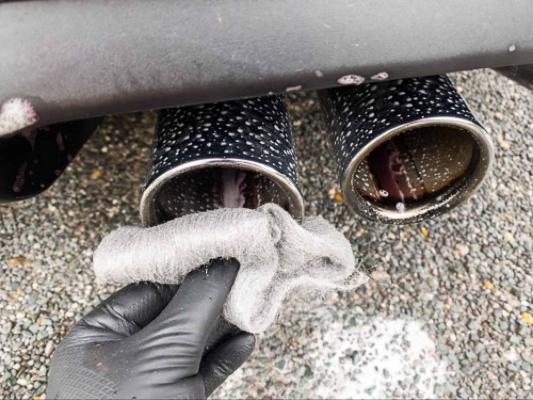
When oil gets into the exhaust, a number of things might happen, such as increased emissions, poor fuel economy, and sensor damage. The most common sources of oil in exhaust are leaks from the engine or unburned gasoline that remains after combustion. There’s a chance there may be oil in your exhaust if you notice blue or gray smoke emerging from it.
There are several explanations for why oil can enter the exhaust system. Several fundamental causes are:
PVC Valve Congestion:
A clogged PCV valve can result in pressure buildup inside the engine, which can cause an oil leak in the exhaust.
When The Seal Is Off:
Oil leaks into the exhaust when the engine is pressed or when seals wear off. This also applies to head gaskets and piston rings.
Worn Off Valve:
Poorly designed valves can be the reason of oil leakage.
Damaged Piston/Rings:
One of the most frequent causes of oil exhaust is a damaged piston.
Broken Cylinders:
Oil may also enter the exhaust system through fractured cylinders.
How Do You Repair Oil From The Exhaust?
Immediately acting upon the discovery of oil leaking from the exhaust is crucial. If they haven’t already, major issues could arise if they are not addressed. To help you get started, we’ve laid out a few steps. Some of these activities should be manageable even if you have little mechanical knowledge and few tools.
Take Off The Oil Cap:
With the engine running, remove the oil cap with caution. Be very careful, since heated oil can squirt. The amount of pressure coming from the crankcase is what you are after. A tiny quantity of air should escape the filler cap of a normally operating engine due to pressure. There can be further problems, such as a clogged PCV valve, if the air blowing out is excessive or smells like fuel. Piston ring wear could also be indicated by it. We refer to this phenomenon as engine blow-by.
Empty The PCV Valve:
Often, the intake manifold is where you’ll find the PCV valve. With the hose still attached, you can remove it from the valve cover. To check if it suctions, place your finger over the exposed end. If yes, then the valve is operating as it should.In the event that it isn’t sucking, clean it. Here are a few actions to take.
Take Out The PCV Valve:
- If there is any dirt or debris, use brake or carburetor cleaner.
- To get rid of the liquid, use compressed air to blow it off.
- Check to determine if the PCV valve functions after replacing it.
- Should that not resolve the issue, it might be necessary to swap out the PCV valve, which is likewise a simple procedure.
Conduct A Leak-Down Exam:
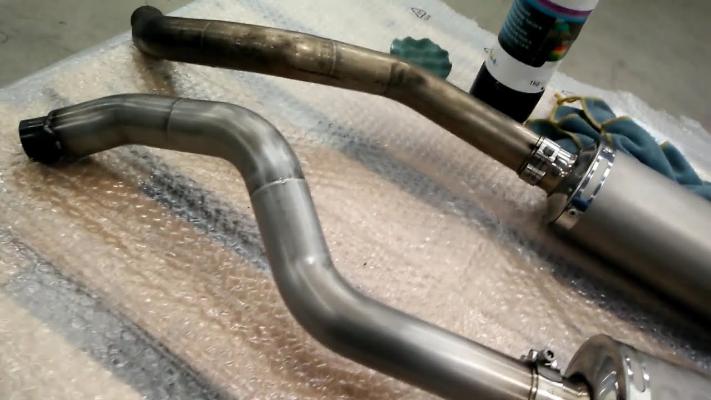
It does require a little extra time and specialized equipment to perform an engine leakdown test. Still, the findings will aid in the diagnosis of the issue. Here are a few actions to do.
- Put the cylinder you are testing in top dead center after removing the plugs.
- Once the spark plug adapter is attached to the gauge, insert it into the opening.
- Attach the pressurized air when the regulator is rotated counterclockwise.
- To pressurize the cylinder, turn the regulator clockwise.
- With every cylinder, note the percentage of leaking.
As instructed by the manufacturer, remove the radiator cap, oil filler cap, and oil dipstick if there is a leak. Listen for air to escape with the throttle body open and the air cleaner removed. Your issue is where the air is leaving the building.
FAQs:
Which Method Of Exhaust Pipe Cleaning Is The Best?
The best car soap and water solution to use is to clean the exhaust pipe. When cleaning exhaust pipes, it’s also critical to use a degreaser. Even though the majority of the oil in the exhaust burns off on its own, it can remain there for a while.
How Can A Rusted Exhaust Pipe Be Cleaned?
Restoring a rusted exhaust pipe to its original condition starts with cleaning it with soap and water. Clean the exhaust tip with a cloth, and then use a firm bristle brush to clean as far down the tail pipe as you can with the exhaust. Rust and carbon deposits can be broken up by using a degreaser.
How Is An Automobile Exhaust Cleaned?
Utilize the soap and water mixture to remove oil residue from the exhaust system. Once the exterior of the exhaust has been cleaned, you may use any old piece of fabric to clean the interior with a metal brush. Pull away as much as you can to get rid of all the grimy layers. To expedite this procedure a bit, you can also use soap directly.
Conclusion:
Oil leaking from your car’s exhaust is not one of those issues that can be put off for a little while. This state indicates a major malfunction, which has to be looked at immediately. This is not the moment to put things off.
Several mechanical issues might cause oil to leak from the exhaust. Perhaps the turbocharger has failed or the PCV valve is clogged. Other possibilities include a burst head gasket, faulty valve seals, broken pistons, a cracked head or block, or failing piston rings.
